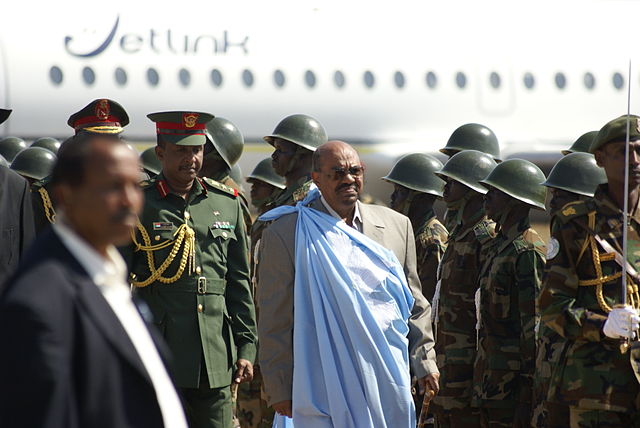Anti-Bashir protests intensify
March 31, 2019 | Expert Insights

Sudanese women are taking the lead in protests against President Omar Bashir. There is a significant backlash against the decades-old morality laws as people take to the streets.
Background
Omar al-Bashir is a Sudanese politician who is currently serving as the seventh president of Sudan and was the head of the National Congress Party. He came to power in 1989 when, as a brigadier in the Sudanese Army, he led a group of officers in a military coup that ousted the democratically elected government of prime minister Sadiq al-Mahdi after it began negotiations with rebels in the south. Since then, he has been elected three times as President - in elections that have been under scrutiny for electoral fraud.
Sudanese protests (2018–19), also known as Sudanese uprising are a series of demonstrations that broke out on 19 December 2018 in some cities in Sudan, due to spiralling costs of living and deterioration of economic conditions at all levels of society, the protests quickly turned from demands for urgent economic reforms into demands for Omar al-Bashir to step down.
The violence of the government's reaction to these peaceful demonstrations sparked international concern. On 22 February, al-Bashir declared a state of emergency and dissolved the national and regional governments, replacing the latter with military and intelligence-service officers. On 8 March, al-Bashir announced that all of the women jailed for protesting against the government would be released.
Sudanese women have a long history of political and social activism. Dr Khalida Zahir, Sudan’s first female doctor, was arrested and flogged in 1946 for opposing British rule. Later in 1951 she co-founded the Sudanese Women’s Union, which fought for women’s right to vote and equal pay and played a key role in the street protests that toppled dictatorial governments in 1964 and 1985.
Analysis
Sparked by a demonstration in December over the rising price of bread, the protests have become the biggest threat to Mr Bashir’s rule since he seized power in a military coup in 1989.
Initially led by mostly male doctors, lawyers and other professionals fed up with economic decline, the movement has since broadened to include more women, youth and political leaders angered by the regime’s corruption and authoritarianism. At least 57 protesters have been killed and hundreds have been arrested since the protests began. Last month Mr. Bashir declared a state of emergency, appointing military and security officials to run Sudan’s 18 states.
Women are now at the forefront of the campaign, often taking to the streets in larger numbers than men. Footage of the demonstrations frequently shows hundreds of women chanting anti-government slogans. In some cases, as many as 80 per cent of the protesters, Ms. Fagiri estimated, have been women. Their participation is a dramatic rebellion against the ageing autocrat — still wanted by the International Criminal Court for alleged war crimes in the eastern Darfur region — and the country’s so-called morality laws, which curtailed women’s rights in the 1990s.
After Mr. Bashir seized power in 1989 his alliance of military leaders and Islamist clerics tightened Islamic laws to win diplomatic support in the Gulf and consolidate its control at home. Under the vaguely defined morality and penal codes, women must cover their heads in public, obtain their male guardian’s consent to marry, and face lashes or even the death penalty for “crimes” such as adultery. Many Sudanese say the laws, which tend to target the poor and marginalised rather than the rich and powerful, are at odds with religious and cultural tolerance of Sudanese society.
That resistance has manifested itself in different ways. On one Sudanese Facebook group, originally set up to identify cheating husbands, its 340,000 female members try to identify undercover intelligence agents from photographs taken at demonstrations.
Despite the intimidation, groups of women continue to protest. “Hey Bashir, get out of here, you can’t face our revolution,” one group of university students chanted at a protest in the capital this month. “Our revolution is a women’s revolution,” they sang.
Assessment
Our assessment is that the protests in Sudan will continue until President Bashir is forced to resign from his decades of stay in power. We believe that the protests will only get bigger and more intense from here on and we feel that the greater participation of women implies a societal opposition to Sudan’s President.
Image Courtesy: Al Jazeera English - Wikimedia Commons
Read more:








Comments